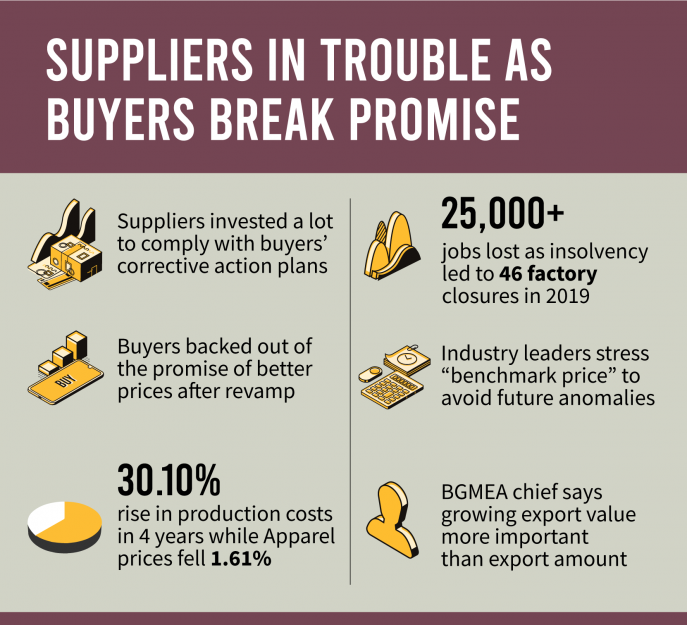38% garment manufacturers under pressure to cut price
Some 46 factories have shut down because of insolvency and low price in the last six months. Also, 25,453 workers have become unemployed since February this year

A readymade garment manufacturer has spent about Tk3 crore to make his 24-line garment factory compliant with the action plans prescribed by buyer brands and retailers.
But he is not reaping any benefit from this extra investment even though the brands had committed to a better price on condition that the factory was made compliant, said the executive director of the factory, seeking anonymity.
"We have installed fire hydrant systems, smoke detection systems, alarms, safe exit doors, and other equipment as per the recommendation of the buyers. But we are not getting a better price."
In 2013, following the Rana Plaza tragedy, the European buyers' platform Accord on Fire and Building Safety in Bangladesh (Accord), and the North American buyers' platform Alliance for Bangladesh Worker Safety (Alliance) had inspected 2300 factories and prescribed some corrective action plans (CAPs) to make the factories safe.
Each factory spent Tk5 crore on average, and as many as 2,300 factories spent an estimated Tk11,500 crore to make their factories compliant as per the CAPs of their brands, said apparel industry sources.
Of these factories, 1,600 are under Accord and 700 under Alliance.
Despite inflation and wage rise, the recent Better Buying Index Report 2019 said 38 percent of Bangladeshi apparel suppliers reported that they are facing pressure from buyers to hold on to last year's price.
According to a recent study by the Bangladesh Garment Manufacturers and Exporters Association (BGMEA), in four years, from the 2014 to the 2018 fiscal years, Bangladeshi apparel prices fell by 1.61 percent while production cost rose by 30.10 percent.
Some apparel manufacturers told The Business Standard that global buyers and brands are putting such pressure on suppliers due to unhealthy competition among suppliers.
Some of them expanded their factories without studying the market demand and required marketing capacity.
As a result, according to a BGMEA source, 46 factories have shut down because of insolvency and low price in the last six months. Also, 25,453 workers have become unemployed since February 2019.
Dr Rubana Huq, president of BGMEA, said that low price is the key reason for the shutdown of those factories.
Several other factories are also at risk of closing down, and some have already terminated their workers, BGMEA sources claimed.
RMG exporters want to set a 'benchmark price' considering all costs of apparel manufacture.
Shahidullah Azim, a former vice-president of BGMEA, said the BGMEA should take the initiative to set a 'benchmark price,' otherwise the sector will be under threat.
"Due to the increasing liabilities of factories including wage hike, new compliance requirements by buyers, bank loans, rise of utility expenses, tax and other production costs, the value growth is going down."
Shahidullah further said, "Most of the factories find it difficult to be sustainable in this sector because a large portion of buyers are not ready to increase price. Instead they look for cheap products and quick delivery."
Mohammad Abdullah Zaber, the deputy managing director of the Noman Group said, "Global buyers are turning to Bangladesh with the expectation of getting quality products at a low price because we do not have any set price benchmark."
Mostafiz Uddin, founder and chief executive officer of Bangladesh Denim Expo and Bangladesh Apparel Exchange, said, "If all exporters unite, buyers will have to pay a fair price because they will not have any alternative. Otherwise, a big disaster is awaiting the industry."
He also said that countries such as Vietnam, Turkey and Pakistan have set a 'benchmark price' of the lowest cost that all the manufacturers need to follow.
Mostafiz further said that many manufacturers are expanding their capacity without doing a proper study. This encourages buyers to put pressure on these suppliers to lower prices.
He said producing value-added products is more important than capacity expansion. The manufacturers need to understand that.
Dr Rubana Huq, BGMEA president told The Business Standard, "People see export growth in terms of amount, not by the value. Such growth is misleading real terms. In the last four years there has been a sharp contrast between the ratio of export growth and the export value."
"We need to work on this issue seriously to come out of such a misleading growth calculation."
The BGMEA wants a long term strategy to keep the RMG sector sustainable, because no other sector has been able create big employment like this sector.
Rubana Huq has requested buyers to maintain prices as per the international standard in order to overcome the present crisis.
She also said, "The exporters must convince the global customers to give us a fair price."
Meanwhile, during a discussion with European Union's Everything But Arms (EBA) technical mission at the commerce ministry on Wednesday, Commerce Secretary Dr Md Jafar Uddin said business cost in general has increased by 29 percent in the last four years.
On the other hand, the price of product has decreased by almost 40 percent since 2010 in some of the basic products in the apparel sector, he said.
He further said almost every garment factory in Bangladesh has to spend huge amount of money for renovation and retrofitting to remain compliant which is an additional cost.
Referring to the decrease of global demand, the secretary said, over the last five years, around 1,200 factories had to be closed due to lack of demand and unhealthy stiff competition orginated due to continuous price cutting effort of buyers and retailers.
Thousands of workers have lost their jobs and passing hard time. Since, last January 59 factories have been closed and 29,700 workers lost their jobs.
The secretary has urged the delegation to take all the issues into consideration while assessing the Bangladesh scenario.
Better Buying Index-19
The Better Buying Index includes 802 verified ratings from 715 suppliers across 52 countries. It measures the performance of 71 retailers and brands.
The latest index report found that 38 percent of Bangladeshi suppliers are under pressure to hold on to last year's prices despite inflation and rising wages.
The index report found that despite long-standing relationships between apparel retailers and manufacturers across South-East Asia including Bangladesh, suppliers are squeezed by cost negotiations that, in some cases, fail to reflect regional wage rises.


 Keep updated, follow The Business Standard's Google news channel
Keep updated, follow The Business Standard's Google news channel
















